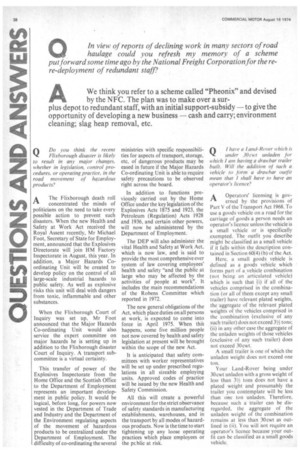Q Do you think the recent Flixborough disaster is likely
Page 40

If you've noticed an error in this article please click here to report it so we can fix it.
to result in any major changes. whether in legislation, control procedures, or operating practice, in the road movement of hazardous products?
A The Flixborough death roll concentrated the minds of politicians on the need to take every possible action to prevent such disasters. When the new Health and Safety at Work Act received the Royal Assent recently, Mr Michael Foot, Secretary of State for Employment, announced that the Explosives Directorate will join HM Factory Inspectorate in August, this year. In addition, a Major Hazards Coordinating Unit will be created to develop policy on the control of all large-scale industrial hazards to public safety. As well as explosive risks this unit will deal with dangers from toxic, inflammable and other substances.
When the Flixborough Court of Inquiry was set up, Mr Foot announced that the Major Hazards Co-ordinating Unit would also service the expert committee on major hazards he is setting up in addition to the Flixborough disaster Court of Inquiry. A transport subcommittee is a virtual certainty.
This transfer of power of the Explosives Inspectorate from the Home Office and the Scottish Office to the Department of Employment represents an important development in public policy. It would be logical, before long, for powers now vested in the Department of Trade and Industry and the Department of the Environment regulating aspects of the movement of hazardous products to be centralized under the Department of Employment. The difficulty of co-ordinating the several ministries with specific responsibilities for aspects of transport, storage, etc, of dangerous products may be eased in future if the Major Hazards Co-ordinating Unit is able to require safety precautions to be observed right across the board.
In addition to functions previously carried out by the Home Office under the key legislation of the Explosives Acts 1875 and 1923, the Petroleum (Regulation) Acts 1928 and 1936, and certain other powers, will now be administered by the Department of Employment.
The DEP will also administer the vital Health and Safety at Work Act, which is now law, and is said to provide the most comprehensive ever system of law covering employees' health and safety "and the public at large who may be affected by the activities of people at work". It includes the main recommendations of the Robens Committee which reported in 1972.
The new general obligations of the Act, which place duties on all persons at work, is expected to come into force in April 1975. When this happens, some five million people not now covered by health and safety legislation at present will be brought within the scope of the new Act.
It is anticipated that safety committees with worker representatives will be set up under prescribed regulations in all sizeable employing units. Approved codes of practice will be issued by the new Health and Safety Commission.
All this will create a powerful environment for the strict observance of safety standards in manufacturing establishments, warehouses, and in the transport by all modes of hazardous products. Now is the time to start tightening up any loose operating practices which place employees or the public at risk.




























































































